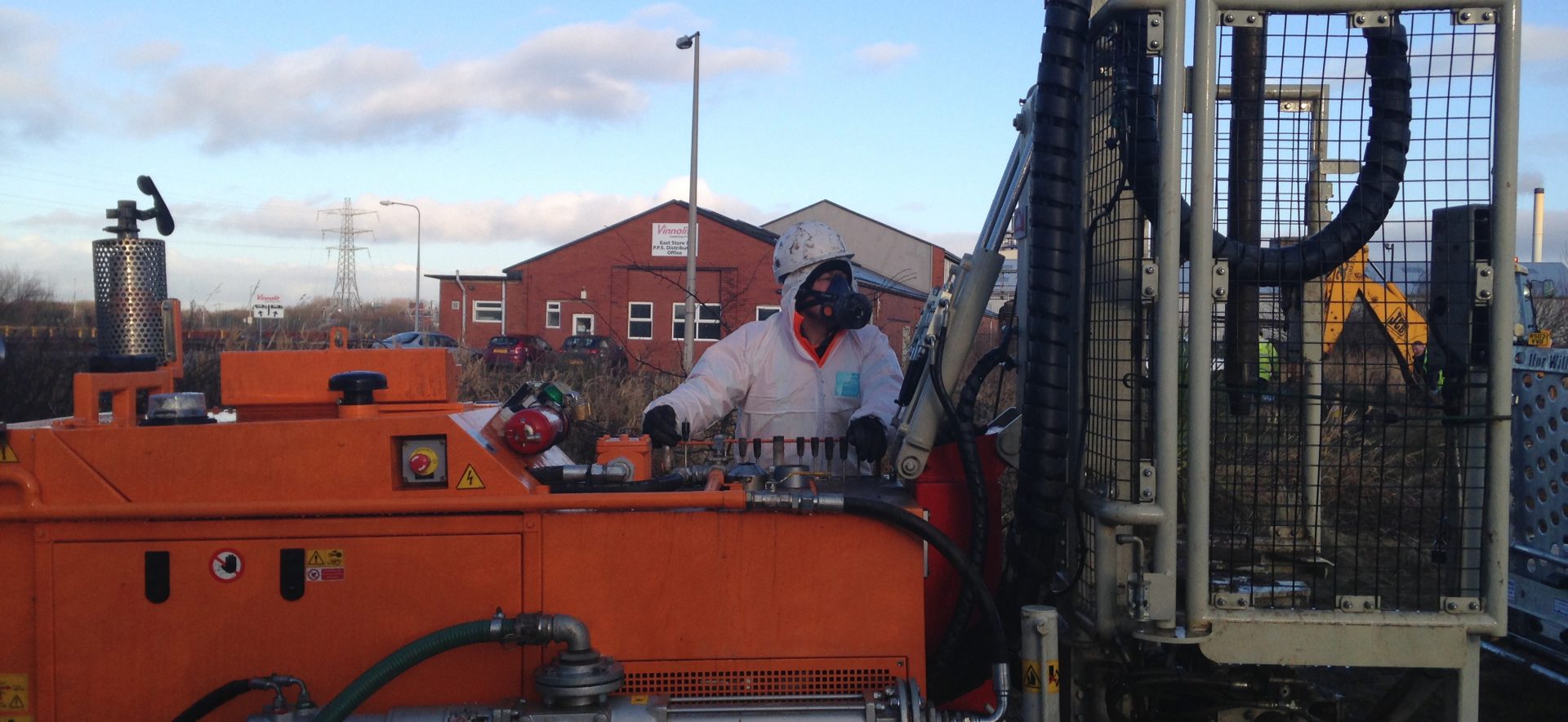Introducing our latest geotechnical health & safety course – MARGI (Managing and working with Asbestos Risk in Ground Investigation)
The UK Construction sector has known for some time about the risks to their workers and others of exposure to asbestos at work. Refurbishment, maintenance, demolition or any other work on any buildings built pre-2000 is highly likely to encounter asbestos in one or more of its many forms as a construction material. More than 3000 products, including numerous construction-related items, have been found to have contained asbestos. The list is growing as more and more of those products are identified and tested.
The recent BDA article in GeoDrilling International highlighted that although some good guidance on asbestos in soil and construction and demolition materials is available, there remains a need for more specific guidance when undertaking intrusive site investigations.
The Control of Asbestos Regulations 2012 (CAR 2012), together with its associated Approved Code of Practice (ACOP) and guidance notes, represent a comprehensive set of guidance covering duties to manage asbestos and work which disturbs or is likely to disturb asbestos. However, as the legislation was principally produced for asbestos risk in buildings it does not adequately address how the guidance should be interpreted where asbestos, or Asbestos Containing Materials (ACMs) are encountered during the normal course of a Ground Investigation (GI). ACMs in soil are unlikely to be in a recognisable ‘original use’ form, but are likely to be present in a broken, damaged or degraded condition. Assessing asbestos risk in buildings can be a systematic process; visual and analytical management surveys of a building can readily locate and identify original form ACMs. Refurbishment and demolition surveys can confirm whether ACMs have been removed before further work is carried out. Unfortunately, such readily accessible survey information may not be available or may be of limited use when planning a ground investigation.
Managing the risks associated with uncovering asbestos during invasive GI work is a critical industry issue – the health risks associated with even minimal exposure to air-borne asbestos fibres is well documented. Current legislation provides a control framework based upon the likely concentrations of asbestos fibres and the positive identification and condition of asbestos; however, this framework is often difficult to apply in the ground investigation context.
Ground Investigation work can involve excavating or drilling through Made Ground formed by human activity which may include the burial of building debris containing ACMs. Whilst CAR 2012 requires duty holders to effectively manage asbestos in buildings and the Construction (Design and Management) Regulations 2015 (CDM 2015) requires duty holders to pass on relevant information to those who might be asked to work with such materials, sometimes ACMs and other sources of asbestos are encountered by chance. In these circumstances, contractors may not have carried out a risk assessment to evaluate the associated hazards, risks and control measures and are therefore at a higher risk of unsafe contact with asbestos fibres.
Generally accepted industry practice is to carry out a desk study to inform the design for any subsequent works and development of a suitable and sufficient risk assessment. Where the desk study provides evidence to indicate asbestos (including type and condition) is likely to be present, the risk can be assessed, and appropriate control measures put in place before work commences. Where a desk study produces limited information that asbestos is likely to be encountered, or where the GI effectively becomes part of the desk study for the main works, the risks associated if asbestos is encountered, become significantly increased.
The problem comes when we think about what happens to those asbestos containing products when buildings have been demolished and the materials discarded or buried on site. Given the historical nature of so much of the Made Ground we encounter, such information is often simply not there. Although much of the asbestos in soil is widely dispersed within the soil matrix, a significant risk remains that degraded and damaged ACMs might be encountered during a normal GI. The standard procedure is to stop and refer the situation back to the consulting engineer, the contract manager, the client or perhaps all three for further instructions. Giving further instruction is often impossible. Invariably, the investigation is simply stopped because the decision maker is not present on-site. Any delay not only leads to increased costs for the client but may also compromise the entire GI itself.
Realistically, what can be done to avoid this situation in the future? What if the site workers including drillers, technicians and engineers have sufficient training, knowledge and experience to decide whether the work constitutes Non-Licensed Work? What if they could independently determine if it was safe to continue, and immediately identify what procedures need to be put in place, how to safely sample the suspect material, how to decontaminate equipment and themselves? What if office-based supervisors, managers and directors have received the same training, giving them the necessary skills to write an asbestos Risk Assessment and Plan of Work, as well as giving them the confidence to trust in the decision making process of their site staff?
Any such training would need to cover all aspects of an asbestos awareness course but would need to be tailored specifically for the Ground Investigation industry. It would need to provide procedures and protocols for Non-Licensed Work in a GI context. Such training should equip delegates with the practical knowledge and understanding of how to complete a suitable and sufficient asbestos risk assessment and to plan and safely manage the works in which asbestos may be encountered. Delegates would also need to learn about procedures to safely sample, contain, label and transport materials suspected of containing asbestos, as well as emergency and decontamination procedures.
Within the UK GI industry, there is a need for specific, practical and pragmatic training and guidance regarding safely managing, planning and working where asbestos has been or is likely to be encountered. The new Managing and working with Asbestos Risk in Ground Investigation (MARGI) course has been developed by industry training experts Equipe, in partnership with health and safety experts EB Safety Solutions and RPA Safety Services. Developed with help and guidance from the HSE, the course aims to provide the necessary training and guidance to navigate delegates through asbestos legislation, whilst outlining a systematic approach for GI work where asbestos is encountered, so that it can be completed in a safe, practical and compliant manner. The course examines the current legislative framework and provides an industry perspective on situations and conditions where sampling and testing involving asbestos can be safely carried out or when works should stop and be re-assessed.
The MARGI course has been collaboratively developed, after extensive consultation with key stakeholders within the UK GI sector, to provide definitive industry guidance on the safe investigation of land contaminated, or potentially contaminated with, asbestos and ACMs. The course is aimed at planners, designers, managers, supervisors and on-site operatives and engineers who are likely to encounter and work with asbestos in soil as part of a ground investigation.
There are a number of asbestos courses in the market however they tend to be generic in content or worse, cater for other disciplines within the construction industry such as those carrying out refurbishment of existing buildings or repair work. The MARGI course has been designed for the ground investigation industry and includes an asbestos awareness section which deals specifically with how ACMs might appear in soils as well as where they might be found in buildings. The course acknowledges the unique and specific circumstances regarding potential contact with asbestos in the geotechnical industry. Key elements of the course include: An overview of legislation, the Risk Assessment and Plan of Work, Awareness for Ground Investigation workers, Non Licensed Work together with practicals, protocols and a final assessment. to determine in a measurable way that delegates have gained appropriate knowledge, information and undergone sufficient training.
It is hoped that the new MARGI course can provide contractors with the means to continue working safely in appropriate situations, whilst granting clients peace of mind that if asbestos is encountered, protocols are in place to allow this to happen.
For more information on the MARGI course, contact Equipe Training via info@equipegroup.com or +44 (0)1295 670990.
Book your place on one of our upcoming MARGI courses:
https://www.equipegroup.com/training/health-and-safety/managing-and-working-with-asbestos-risk-in-ground-investigation

